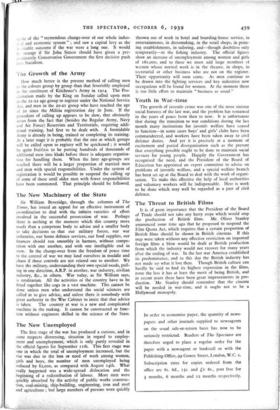The New Unemployed
The first stage of the war has produced a curious, and in some respects distressing, situation in regard to employ- ment and unemployment, which is only partly revealed in the official figures for September 11th. This first stage was one in which the total of unemployment increased, but the rise was due to the loss or need of work among women, girls and boys, the number of men unemployed being reduced by 82,000, as compared with August 14th. What really happened was a wide-spread dislocation and the beginning of a redistribution of labour. More men were quickly absorbed by the activity of public works construc- tion, coal-mining, ship-building, engineering, iron and steel and agriculture ; bui large numbers of persons were quickly thrown out of work in hotel and boarding-house service, in entertainments, in dressmaking, in the retail shops, in print- ing establishments, in tailoring, and—though doubtless only temporarily—in the fishing industry. The official figures show an increase of unemployment among women and girls of 181,000, and to these we must add large numbers of women whose normal work is in the theatre, in shops, in secretarial or other business who are not on the register. Their opportunity will soon come. As men continue to be drawn into the fighting services and key industries new occupations will be found for women. At the moment there is too little effort to maintain " business as usual."


































 Previous page
Previous page